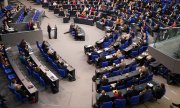Crisis in Berlin: was the chancellor's address enough?
After a ruling by the German Federal Constitutional Court left a huge hole in the government's proposed budget for 2024, Chancellor Olaf Scholz's statement on the judgment was eagerly anticipated both in Germany and abroad. However, many had hoped for more detailed explanations from Scholz on Tuesday, as a glance at the commentary sections shows.
A letdown on all counts
Zeit Online is disappointed on three counts:
“After a ruling by the German Constitutional Court convicted the traffic light coalition of trickery and stripped it of its financial basis overnight, one would have expected firstly an apology from the person who, as chancellor and former finance minister, bears responsibility for the resulting mess. Secondly, one would have liked to know what will happen now with the 2024 federal budget, and thirdly, one would have appreciated a few meaningful words of reassurance to the worried nation. After 22 minutes of his government address - three minutes less than he was entitled to - it must be said with regret: the Chancellor delivered none of that on this Tuesday morning.”
Uncertainty worse than the truth
Der Standard says what is most lacking is transparency:
“Clearly something will have to change on the expenditure side if the population is not to be burdened with new taxes. But Scholz doesn't say a word about that, and only talks about 'challenges' and 'toughness'. Citizens and businesses would certainly have liked to learn more. ... The Germans want to know in which areas the government plans to make cuts. It no doubt has a few ideas already. So let's have it. Uncertainty is often worse than the truth - even if it's hard to swallow.”
Europe needs a strong Germany
Germany's tricks could harm the EU, warns Le Monde:
“The current crisis in Berlin should be a warning for Europe, especially because no political compromise is in sight. It raises the crucial question for Berlin's partners of what role Germany is prepared to play in a Europe whose foundations and security are more under attack than they have ever been since the Second World War, and whose economy is seriously at risk. ... Germany does not appear to be politically prepared to assume the role that is expected of it: that of a strong guarantor for Europe. ... The current challenges cannot be met by resorting to financial policy tricks. They require a political debate.”
Polls bind coalition partners together
The government in Berlin is likely to remain stable precisely because of its growing unpopularity, the Aargauer Zeitung reckons:
“The next rift within the coalition is preprogrammed: to save money, the liberal Finance Minister Christian Lindner wants to phase out the gas price brake that was introduced after the Russian invasion of Ukraine. Scholz also wants this, but many of his party colleagues don't. Nonetheless, new elections, as Bavarian Minister President and CSU leader Markus Söder is calling for, are unlikely to take place in the foreseeable future: the SPD and FDP's poll ratings are abysmal, and those of the Greens are also gradually starting to erode. The unequal partners will therefore remain chained together for the time being.”
A tough rendezvous with reality
Scholz now needs to effect three major turnarounds, Handelsblatt explains:
“The security policy reform after the Ukraine war, the environmental reform of the economy, and now a financial policy reform after the constitutional court ruling. All three require a break with decades of established state practice. The energy transition is a little different because it affects more or less all societies. The financial policy turnaround will be even more difficult to implement politically than the security policy turnaround. After more than a decade of upswing and four years of crisis-related special fiscal policy, weaning a society off increasingly generous subsidies will be a tough rendezvous with reality.”

